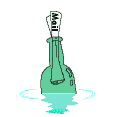Writings
Movements
Whispers about me
See my posse ...
Poetry ...
More poetry
Writings
Sites I'ld like you to see
Guest Book
My other sites
Insect pic's
Photograph's
My nest
Some of it mine ..
GRAFSCHRIFT '87
Rond mijn huis worden de bomen gekapt
de moterzagen gieren als ze in het hout bijten
net wolven, hun hoge gejank gaat steeds maar door
Daar valt de boom van de eekhoorns
Diepe kreunen, hard gekraak als van botten
Mama, een slachthuis hier buiten mijn raam
De eik is geen eik meer, maar een stapel blokken .. dood.
Als de boom eenmaal geveld is, glijd de zaag er doorheen
de boom vecht niet meer..
De takken worden versnipperd en uitgestrooid,
als de as van doden.
Vreemde tijden, en zo angstaanjagend voor mij
De ogen van mijn kind zijn groen-bruin .. de kleur van bomen ...
Rond mijn huis worden de bomen gekapt
de moterzagen gieren als ze in het hout bijten
net wolven, hun hoge gejank gaat steeds maar door
Daar valt de boom van de eekhoorns
Diepe kreunen, hard gekraak als van botten
Mama, een slachthuis hier buiten mijn raam
De eik is geen eik meer, maar een stapel blokken .. dood.
Als de boom eenmaal geveld is, glijd de zaag er doorheen
de boom vecht niet meer..
De takken worden versnipperd en uitgestrooid,
als de as van doden.
Vreemde tijden, en zo angstaanjagend voor mij
De ogen van mijn kind zijn groen-bruin .. de kleur van bomen ...

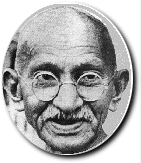
Rots '91
Als je gevoel als een rusteloze zee is,
_ zoals bij mij _
Ben jij dan het vlot op de golven
of de rots eronder ?
Als je gevoel als een rusteloze zee is,
_ zoals bij mij _
Ben jij dan het vlot op de golven
of de rots eronder ?

"Maybe this world is another planet's Hell."
- Aldous Huxley (1894-1963)
- Aldous Huxley (1894-1963)

Iets van donkergroen '91
Zoals een bange nacht met sterren
Nat klimopblad vlak boven mijn hoofd
Duizend jaar oude eik licht op in bliksem
Strijklicht van auto's over struikgewas
.... en ik eronder
Koude lucht en hete tranen
.... niet bizonder.
Zoals een bange nacht met sterren
Nat klimopblad vlak boven mijn hoofd
Duizend jaar oude eik licht op in bliksem
Strijklicht van auto's over struikgewas
.... en ik eronder
Koude lucht en hete tranen
.... niet bizonder.
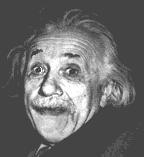
"Only two things are infinite, the universe and human stupidity, and I'm not sure about the former."
- Albert Einstein (1879-1955)
- Albert Einstein (1879-1955)
De fles linkt naar 'Flessepost'
De lege zee
Ik dobber rond, op lege zee.
Ontworteld, angstig, en gewond, maar nee...
Geen haven nog of eenzaam strand,
In mijn groene glazen hart een kreet...
Ik zoek een zielsverwant..... die 'weet'.
Een ander mens, die ook verder kijkt,
dan tot waar zijn blikveld reikt.
Ik dobber rond, op lege zee.
Ontworteld, angstig, en gewond, maar nee...
Geen haven nog of eenzaam strand,
In mijn groene glazen hart een kreet...
Ik zoek een zielsverwant..... die 'weet'.
Een ander mens, die ook verder kijkt,
dan tot waar zijn blikveld reikt.
Bottle links to 'bottlemail'
Message in a bottle
I'm floating here ... on empty seas
dismemberd, frightend and wounded .. but no ..
No harbor yet, or lonely shore ...
in my green, glass, heart a cry,
I'm searching for a soulmate, one that "knowes"
.. an other human being, who will also
Reach, beyond the horizons of the soul.
I'm floating here ... on empty seas
dismemberd, frightend and wounded .. but no ..
No harbor yet, or lonely shore ...
in my green, glass, heart a cry,
I'm searching for a soulmate, one that "knowes"
.. an other human being, who will also
Reach, beyond the horizons of the soul.
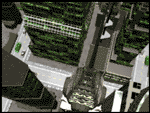
IK HEB JE LIEF
Steeds zoek ik
in vreemde steden,
om onbekende hoeken.
In de ogen van onbekende mensen ...
Steeds zoek ik jou blik.
Steeds zoek ik
in vreemde steden,
om onbekende hoeken.
In de ogen van onbekende mensen ...
Steeds zoek ik jou blik.
Ode aan het Moederkruid

'88
Glanzend hard zaad, rulle aarde
Water & Warmte & Tijd
Wortels en witte krioelkiemen zien licht !
later ..
Planten, jong en gretig groeiend
Planten, sterk en buigzaam, reikhalzend
Planten, grote geveerde handbladeren
en dan ..
De grote twee-deling __ Bloei
Aleen de vrouwen zullen blijven
(blijven wij niet altijd, de sterkste, de geurigste, het langste ?)
Heil aan de moeders !
later ..
Groter dan een mens, ruig groen gewas
Toppen, vet en golden brown
Nazomerzon over harsberijpte planten
Oogst
Het geurigste handwerk
Dank de planten in stilte
Handpalmen vol hars
later ..
De droogzolder hangt vol
Moeder aarde was gul
Nu is het tijd voor een pijpje
en prijs het Moederkruid hardop !
Vrienden, welriekende rook & en een glimlach
Glanzend hard zaad, rulle aarde
Water & Warmte & Tijd
Wortels en witte krioelkiemen zien licht !
later ..
Planten, jong en gretig groeiend
Planten, sterk en buigzaam, reikhalzend
Planten, grote geveerde handbladeren
en dan ..
De grote twee-deling __ Bloei
Aleen de vrouwen zullen blijven
(blijven wij niet altijd, de sterkste, de geurigste, het langste ?)
Heil aan de moeders !
later ..
Groter dan een mens, ruig groen gewas
Toppen, vet en golden brown
Nazomerzon over harsberijpte planten
Oogst
Het geurigste handwerk
Dank de planten in stilte
Handpalmen vol hars
later ..
De droogzolder hangt vol
Moeder aarde was gul
Nu is het tijd voor een pijpje
en prijs het Moederkruid hardop !
Vrienden, welriekende rook & en een glimlach
In memoriam
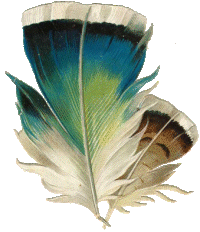
Tante Mies December '94
Je was als een oude wijze boom
met laat winterblad en spinrag
O ik hield zo veel van jou.
Je takken reikten tot de grond,
omarmden mij zo liefdevol..
Vrijmetselaars, Rozekruisers en Lao-Tse,
boeken in jouw kast met donkere ruitjes.
Speeldozen en houtsnijwerk uit Indie.
Daar een stuk bewerkt ivoor, hier een zilveren krisj,
dierbaar en geheimzinnig verleden.
Jij nam mij altijd serieus, en zag in het kind,
de latere vrouw in mij.
O, ik hou zoveel van jou .. ik zal je nooit vergeten.
Je was als een oude wijze boom
met laat winterblad en spinrag
O ik hield zo veel van jou.
Je takken reikten tot de grond,
omarmden mij zo liefdevol..
Vrijmetselaars, Rozekruisers en Lao-Tse,
boeken in jouw kast met donkere ruitjes.
Speeldozen en houtsnijwerk uit Indie.
Daar een stuk bewerkt ivoor, hier een zilveren krisj,
dierbaar en geheimzinnig verleden.
Jij nam mij altijd serieus, en zag in het kind,
de latere vrouw in mij.
O, ik hou zoveel van jou .. ik zal je nooit vergeten.
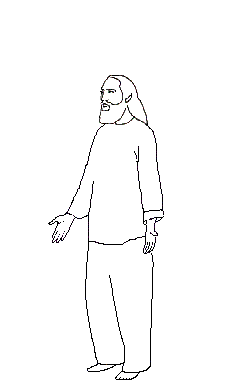
"In the End, we will remember not the words of our enemies, but the silence of our friends."
- Martin Luther King Jr. (1929-1968)
- Martin Luther King Jr. (1929-1968)
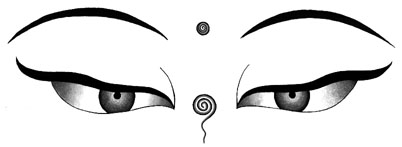
There are two ways to create happiness. The first is external. By obtaining better shelter, better clothes, and better friends, we can find a certain measure of happiness and satisfaction.
The second is through mental development, which yields inner happiness. However, these two approaches are not equally viable. External happiness cannot last long without its counterpart. If something is missing in your heart--then despite the most luxurious surroundings, you cannot be happy. However, if you have peace of mind, you can find happiness even under the most difficult circumstances.
[There are] valuable techniques from the Tibetan traditions which, if implemented in daily practice, lead to mental peace. As you calm your mind and heart, your agitation and worry will naturally subside, and you will enjoy more happiness. Your relationships with others will reflect these changes. And as a better human being, you will be a better citizen of your country, and ultimately a better citizen of the world.
We are all born helpless. Without a parent's kindness we could not survive, much less prosper. When children grow up in constant fear, with no one to rely on, they suffer their whole lives. Because the minds of small children are very delicate, their need for kindness is particularly obvious.
Adult human beings need kindness too. If someone greets me with a nice smile, and expresses a genuinely friendly attitude, I appreciate it very much. Though I might not know that person or understand their language, they instantly gladden my heart. On the other hand, if kindness is lacking, even in someone from my own culture whom I have known for many years, I feel it. Kindness and love, a real sense of brotherhood and sisterhood, these are very precious. They make community possible and thus are crucial to society.
On every level--as individuals, and as members of a family, a community, a nation and a planet--the most mischievous troublemakers we face are anger and egoism. The kind of egoism I refer to here is not just a sense of I, but an exaggerated self-centeredness. No one claims to feel happy while being angry. As long as anger dominates our disposition, there is no possibility of lasting happiness. In order to achieve peace, tranquility, and real friendship, we must minimize anger and cultivate kindness and a warm heart.
Developing a warm heart ourselves can also transform others. As we become nicer human beings, our neighbors, friends, parents, spouses, and children experience less anger. They will become warm-hearted, compassionate, and harmonious. The very atmosphere becomes happier, which promotes good health, perhaps even a longer life.
The central method for achieving a happier life is to train your mind in a daily practice that weakens negative attitudes and strengthens positive ones. The big question is whether or not we can practice kindness and peace. Many of our problems stem from attitudes like putting ourselves first at all costs. I know from my own experience that it is possible to change these attitudes and improve the human mind.
Though it is colorless, shapeless, and sometimes weak, the human mind can become stronger than steel. To train the mind, you must exercise the patience and determination it takes to shape the steel. If you practice improving your mind with a strong will and forbearance by trying, no matter how many difficulties you may encounter at the beginning, then you will succeed. With patience, practice, and time, change will come.
The harmony and friendship that we need in our families, nations, and the world can be achieved only through compassion and kindness. By helping one another, with concern and respect, we can solve many problems easily. Harmony cannot thrive in a climate of mistrust, cheating, bullying, and mean-spirited competition. Success through intimidation and violence is temporary at best; its trifling gains only create new problems. This is why just a couple of decades after the First World War, the Second World War was fought, and millions more people were killed. If we examine our long history of hatred and anger, we see the obvious need to find a better way. We can only solve our problems through truly peaceful means--not just peaceful words but a peaceful mind and heart.
Is this possible? Fighting, cheating, and bullying have trapped us in our present situation; now we need training in new practices to find a way out. It may seem impractical and idealistic, but we have no alternative to compassion, recognizing human value and the oneness of humanity: This is the only way to achieve lasting happiness.
I travel from country to country with this sense of oneness. I have trained my mind for decades, so when I meet people from different cultures there are no barriers. I am convinced that despite different cultures and different political and economic systems, we are all basically the same. The more people I meet, the stronger my conviction becomes that the oneness of humanity, founded on understanding and respect, is a realistic and viable basis for our conduct.
Wherever I go, this is what I speak about.I believe that the practice of compassion and love--a genuine sense of brotherhood and sisterhood--is the universal religion. It does not matter whether you are Buddhist or Christian, Moslem or Hindu, or whether you practice a religion at all. What matters is your feeling of oneness with humankind.
Do you agree? Do you think it is nonsense? I am not a God King, as some call me. I am just a Buddhist monk. What I am saying comes from my own practice, which is limited. But I do try to implement these ideas in my daily life, especially when I face problems. Of course, I fail sometimes. Sometimes I get irritated. Occasionally I use a harsh word, but when I do, immediately I feel "Oh, this is wrong." I feel this because I have internalized the practices of wisdom and compassion.
I call compassion the global staple. Human beings want happiness and do not want suffering. Mental peace is a basic need for all humankind. For politicians, engineers, scientists, homemakers, doctors, teachers, lawyers--for all people in every endeavor--a healthy, compassionate motivation is the foundation of spiritual growth.
The Dalai Lama
The second is through mental development, which yields inner happiness. However, these two approaches are not equally viable. External happiness cannot last long without its counterpart. If something is missing in your heart--then despite the most luxurious surroundings, you cannot be happy. However, if you have peace of mind, you can find happiness even under the most difficult circumstances.
[There are] valuable techniques from the Tibetan traditions which, if implemented in daily practice, lead to mental peace. As you calm your mind and heart, your agitation and worry will naturally subside, and you will enjoy more happiness. Your relationships with others will reflect these changes. And as a better human being, you will be a better citizen of your country, and ultimately a better citizen of the world.
We are all born helpless. Without a parent's kindness we could not survive, much less prosper. When children grow up in constant fear, with no one to rely on, they suffer their whole lives. Because the minds of small children are very delicate, their need for kindness is particularly obvious.
Adult human beings need kindness too. If someone greets me with a nice smile, and expresses a genuinely friendly attitude, I appreciate it very much. Though I might not know that person or understand their language, they instantly gladden my heart. On the other hand, if kindness is lacking, even in someone from my own culture whom I have known for many years, I feel it. Kindness and love, a real sense of brotherhood and sisterhood, these are very precious. They make community possible and thus are crucial to society.
On every level--as individuals, and as members of a family, a community, a nation and a planet--the most mischievous troublemakers we face are anger and egoism. The kind of egoism I refer to here is not just a sense of I, but an exaggerated self-centeredness. No one claims to feel happy while being angry. As long as anger dominates our disposition, there is no possibility of lasting happiness. In order to achieve peace, tranquility, and real friendship, we must minimize anger and cultivate kindness and a warm heart.
Developing a warm heart ourselves can also transform others. As we become nicer human beings, our neighbors, friends, parents, spouses, and children experience less anger. They will become warm-hearted, compassionate, and harmonious. The very atmosphere becomes happier, which promotes good health, perhaps even a longer life.
The central method for achieving a happier life is to train your mind in a daily practice that weakens negative attitudes and strengthens positive ones. The big question is whether or not we can practice kindness and peace. Many of our problems stem from attitudes like putting ourselves first at all costs. I know from my own experience that it is possible to change these attitudes and improve the human mind.
Though it is colorless, shapeless, and sometimes weak, the human mind can become stronger than steel. To train the mind, you must exercise the patience and determination it takes to shape the steel. If you practice improving your mind with a strong will and forbearance by trying, no matter how many difficulties you may encounter at the beginning, then you will succeed. With patience, practice, and time, change will come.
The harmony and friendship that we need in our families, nations, and the world can be achieved only through compassion and kindness. By helping one another, with concern and respect, we can solve many problems easily. Harmony cannot thrive in a climate of mistrust, cheating, bullying, and mean-spirited competition. Success through intimidation and violence is temporary at best; its trifling gains only create new problems. This is why just a couple of decades after the First World War, the Second World War was fought, and millions more people were killed. If we examine our long history of hatred and anger, we see the obvious need to find a better way. We can only solve our problems through truly peaceful means--not just peaceful words but a peaceful mind and heart.
Is this possible? Fighting, cheating, and bullying have trapped us in our present situation; now we need training in new practices to find a way out. It may seem impractical and idealistic, but we have no alternative to compassion, recognizing human value and the oneness of humanity: This is the only way to achieve lasting happiness.
I travel from country to country with this sense of oneness. I have trained my mind for decades, so when I meet people from different cultures there are no barriers. I am convinced that despite different cultures and different political and economic systems, we are all basically the same. The more people I meet, the stronger my conviction becomes that the oneness of humanity, founded on understanding and respect, is a realistic and viable basis for our conduct.
Wherever I go, this is what I speak about.I believe that the practice of compassion and love--a genuine sense of brotherhood and sisterhood--is the universal religion. It does not matter whether you are Buddhist or Christian, Moslem or Hindu, or whether you practice a religion at all. What matters is your feeling of oneness with humankind.
Do you agree? Do you think it is nonsense? I am not a God King, as some call me. I am just a Buddhist monk. What I am saying comes from my own practice, which is limited. But I do try to implement these ideas in my daily life, especially when I face problems. Of course, I fail sometimes. Sometimes I get irritated. Occasionally I use a harsh word, but when I do, immediately I feel "Oh, this is wrong." I feel this because I have internalized the practices of wisdom and compassion.
I call compassion the global staple. Human beings want happiness and do not want suffering. Mental peace is a basic need for all humankind. For politicians, engineers, scientists, homemakers, doctors, teachers, lawyers--for all people in every endeavor--a healthy, compassionate motivation is the foundation of spiritual growth.
The Dalai Lama


